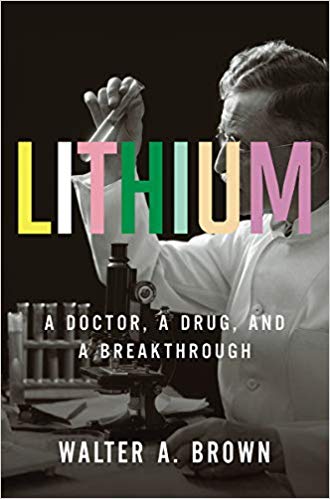
In 1949, Australian doctor John Cade, working alone and in obscurity, discovered that lithium–a natural occurring substance like salt–could relieve the symptoms of manic depression (aka, bipolar syndrome). Cade published his work, which was mostly ignored, and for decades a treatment for one of the worst mental health problems went unnoticed.
One reason for lithium being ignored is that it wasn’t a drug that pharmaceutical companies could make Big Money on. You can get lithium at your local health food store for a few bucks. Meanwhile, people suffering with manic depression or bipolar syndrome where given expensive electroshock treatments and psychotropic drugs that didn’t work well. In the 1970s, Norman Lear’s Maude (based on his wife) featured an episode where Maude takes a drug that helps her combat her depression. The Network censors would not allow the word “lithium” to be spoken (p. 147), but Lear’s wife was on it at the time and found great relief from her mood swings. A couple decades later, Homeland’s Carrie Mathison (played by Claire Danes) struggles with her psychotic problems and only finds relief with lithium (p. 148).
Three years ago, I started to experience vague but persistent anxiety and troubled sleep. I could find no logical reasons for these conditions. At that time I read an article in the New York Times about lithium. Regions with high lithium levels in their drinking water–Texas, Japan, Austria, Greece (p. 183)–had lower levels (up to 50% decrease) in suicide rates. And lower rates of manic depression. So I bought a bottle of lithium and started taking it. Within a week, my vague anxiety disappeared. I started sleeping better and longer. My blood pressure went down. Placebo Effect? Possibly. But I returned to normal and I’ve continued to take lithium daily ever since. Walter A. Brown’s Lithium explains why my mental health and the mental health of thousands of others improved. GRADE: A
TABLE OF CONTENTS:
Introduction vii
1. Manic-Depressive Illness, A Brief History 1
2. The Naturalist 29
3. Lithium 47
4. Breakthrough 61
5. Aftermath 89
6. Prophylaxis Rex 127
Epilogue 165
Acknowledgments 191
Notes 193
Selected Bibliography 205
Index 213
Very interesting about your own experience with Lithium. Patty Duke is another who suffered with bipolar issues for years before getting proper treatment, and it destroyed her marriage to John Astin. Jackie isn’t talking to her sister at this point, but the latter has always had extreme mood swings consistent with bipolar issues.
It doesn’t make me want to read the book, but I’m glad if it helps.
Jeff, the astonishing aspect of LITHIUM is that a cheap and effective treatment for a devastating medical condition was available…but it was ignored for decades. I suspect this happens more often these days with Big Pharma calling the shots.
Thank you for sharing this. Others will benefit from it.
Dan, three years ago I thought I was losing my mind. I couldn’t figure out what was going on. But lithium fixed my problem and I’m very relieved.
George, good to hear that it worked!
My father also got Lithium later. He had been shot in the head on the Russian Front in 1944 in WW2 which defined the end of fighting for him. If that hadn’t happened he probably wouldn’t have survived the war as a German officer.
I remember him as quite “normal” when I was a child, he worked in an office, but of course he got other medications too:
Librium,and some others that wp blocks, at that time the most advanced psycho-drugs. But when he had real stress he was usually sent to a special hospital for ex-soldiers for a few days …
I remember this happened when we got a new house – on the day of moving he collapsed, so my mother, us children and the moving company had to do the work alone.
PS:
Tried this morning to send this comment – but wp didn’t accept it.
Now I know – in my comment were several forbidden words like V****m …
Wolf, WORDPRESS is very prissy about language.
Wolf, glad your father got relief from Lithium, too. WORDPRESS gets grumpy on Mondays.
Good that it worked for you, George. Like Jeff, I have no interest in reading the book.
Rick, at the time I just wanted to get back to normal. Fortunately, lithium worked for me.